Children are the foundation of the future, and quality education can set a child’s course for success or failure. Considering this, how could a career in early childhood education not be considered rewarding and heroic? Graduates with this degree go on to shape their country’s youth and work toward a better, more educated future.
A career in early childhood education entails working with children in the earliest and most formative stages of their development and education. These teachers help students develop the social, personal, and academic skills required for continued success both in the classroom and beyond.
In this guide, we’ll cover everything a degree in early childhood education might entail, as well as several career options for which a graduate in early childhood education will be well qualified.
There’s no time like the present to start preparing for the future, so let’s begin.
What Is Early Childhood Education

Early childhood education graduates will have a strong foundation not only in early childhood development but also in family studies. The coursework will span everything from liberal arts to human ecology, with real-world experience gained by internships in classrooms or in licensed child care centers.
The area of focus in early childhood education is from birth to roughly 8 or 9 years old, which is typically about third grade. These programs also commonly qualify graduates to identify and instruct special needs children, including those with learning disabilities or other developmental concerns.
Some early childhood education programs also allow students to pursue areas of specialization, including reading or English as a second language.
The ultimate outcome of childhood education is to lay a solid framework for a lifelong love of learning.
Graduates from early childhood education programs are qualified to teach at both public and private institutions, but teaching in a public K–12 institution does require additional teaching certification.
Pamela Morris, Early Childhood Education Director at the East Valley JCC in Chandler, AZ, earned her MSEd (master of education) at Binghamton University. She’s found her degree to be helpful throughout her career.
“This field of study is so important in the educational world,” Morris tells Online Schools Report.
“Anyone who wants to work with young children, whether in a private or public setting, would benefit greatly from this degree,” she says.
Early childhood development degrees are offered both at in-person colleges and universities, but also frequently online, including associate, bachelor’s, and master’s degrees options.
Choosing an online program allows students to work at their own pace and on their own time, enabling them to pursue higher education without having to overhaul their lives. They are also commonly much more affordable.
For those interested in going the extra mile, there’s the National Board for Professional Teaching Standards (NBPTS), which enables educators to pursue a voluntary Early Childhood Generalist Certificate to demonstrate their talents.
Because of this rigorous assessment, those certified by the National Board are more competitive for employment in early childhood education and often command higher salaries.
More than anything, a degree in early childhood education will prepare a student for a future working with children. They aim to build a safe, holistic, and caring educational environment to prepare students to meet learning milestones as well as encouraging them to fulfill their potential in both the long and short term.
Let’s now take a closer look at a few career opportunities provided by a degree in early childhood education.
Careers in Early Childhood Education
A degree in early childhood education opens doors to many career opportunities. Some of the most common careers in early childhood education are listed below, including the approximate number of years of education required for each position and average annual salary information, according to the Bureau of Labor Statistics. Other jobs that a degree in early childhood education can lead to include nanny, family support services, teacher’s assistant or aide, and many others.
| Job Title | Approx. # Years of Education | Average Annual Salary |
| Preschool Teacher | 2 | $30,520 |
| Elementary School Teacher | 4 | $59,420 |
| Childcare Center Director | 4 | $48,210 |
| Special Education Teacher | 4 | $61,030 |
| Instructional Coordinators | 6 | $66,290 |
All salary data is courtesy U.S. Bureau of Labor Statistics Occupational Outlook Handbook.
Preschool Teacher

Preschool teachers work with students younger than five years old, playing an important and formative role in the future success of the child, both in education and in life.
At these early stages, this can include simply playing in a sandbox or teaching basic math principles with colored blocks, because play is one of the most effective tools for teaching at such a young age.
But it’s not all play. Preschool teachers cover the basics, including the identification of colors, shapes, numbers, and letters. They also keep a keen eye for students that might need extra one-on-one attention, which can help spot possible learning disabilities or other developmental delays early on.
Part of a preschool teacher’s job is to plan and carry out a curriculum that focuses on all the different areas of child development, as well as to organize activities that encourage children to develop important skills while exploring the world.
In addition, preschool teachers develop schedules and routines, interspersing into the school day rest and physical activity, both of which are vitally important for children.
If signs of emotional or developmental delays are noticed, it is also the job of a preschool teacher to bring these issues to the attention of the parent or guardian of the child, while also keeping thorough and detailed records of the child’s progress and relative development.
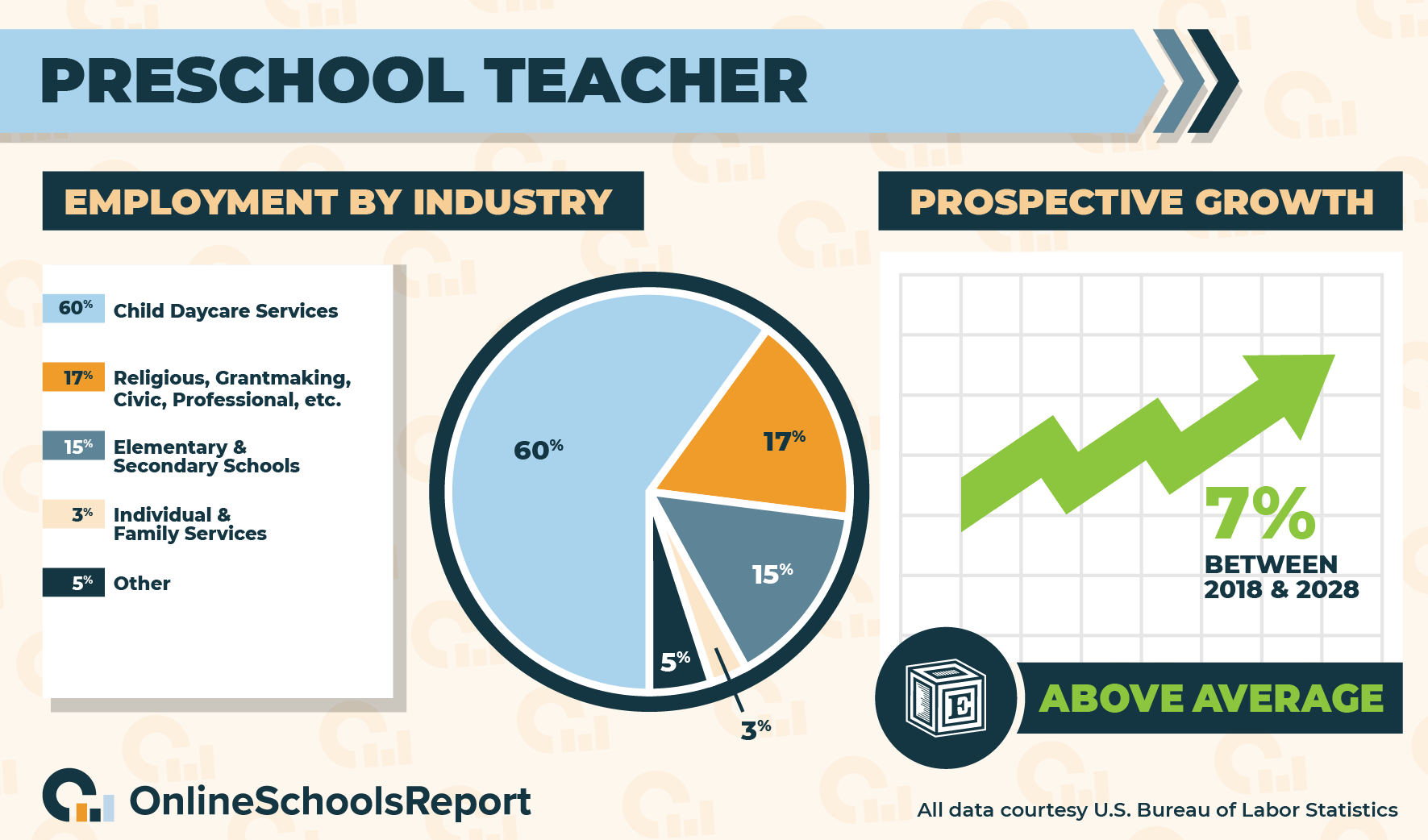
A degree in early childhood education will also provide preschool teachers with training in equity and inclusion, since preschool teachers must work with children and families of different ethnic, religious, and social backgrounds.
As of 2019, the median pay for a preschool teacher is $30,520, according to the Bureau of Labor Statistics, with job growth estimated at 7% in the years spanning 2018 to 2028, which is faster than the national average in many other industries.
There are roughly 523,600 preschool teaching jobs in the U.S., and an associate degree in early childhood education at minimum is required for most positions, according to the BLS.
Citing more data from the BLS, states with high levels of employment in this field include California and Texas, and the highest concentration of jobs in this profession are in New Hampshire and Massachusetts.
Elementary School Teacher

Kindergarten and elementary school teachers build on the education and life skills that are laid down by preschool teachers. How a student feels about school at the elementary school level can make a world of difference in how the child will engage and interact with school going forward, and elementary school teachers are there every step of the way.
Elementary school teachers create lesson plans in subjects such as reading, science, and math, while observing and evaluating students’ abilities, strengths, and weaknesses, both socially and academically.
At this stage, students are introduced to abstract concepts and problem-solving skills, while also developing critical thinking skills. An elementary school teacher may, for example, demonstrate a science experiment for the students to then try for themselves. Group work to solve problems and learn specific concepts are also important at this stage of development.
How children interact with one another is vitally important at this stage, and these teachers are there to guide children through whatever struggles they may face. Elementary school teachers also grade students’ assignments, remaining in communication with parents and guardians about the child’s progress while also working with students individually to help address specific learning challenges and deficits.
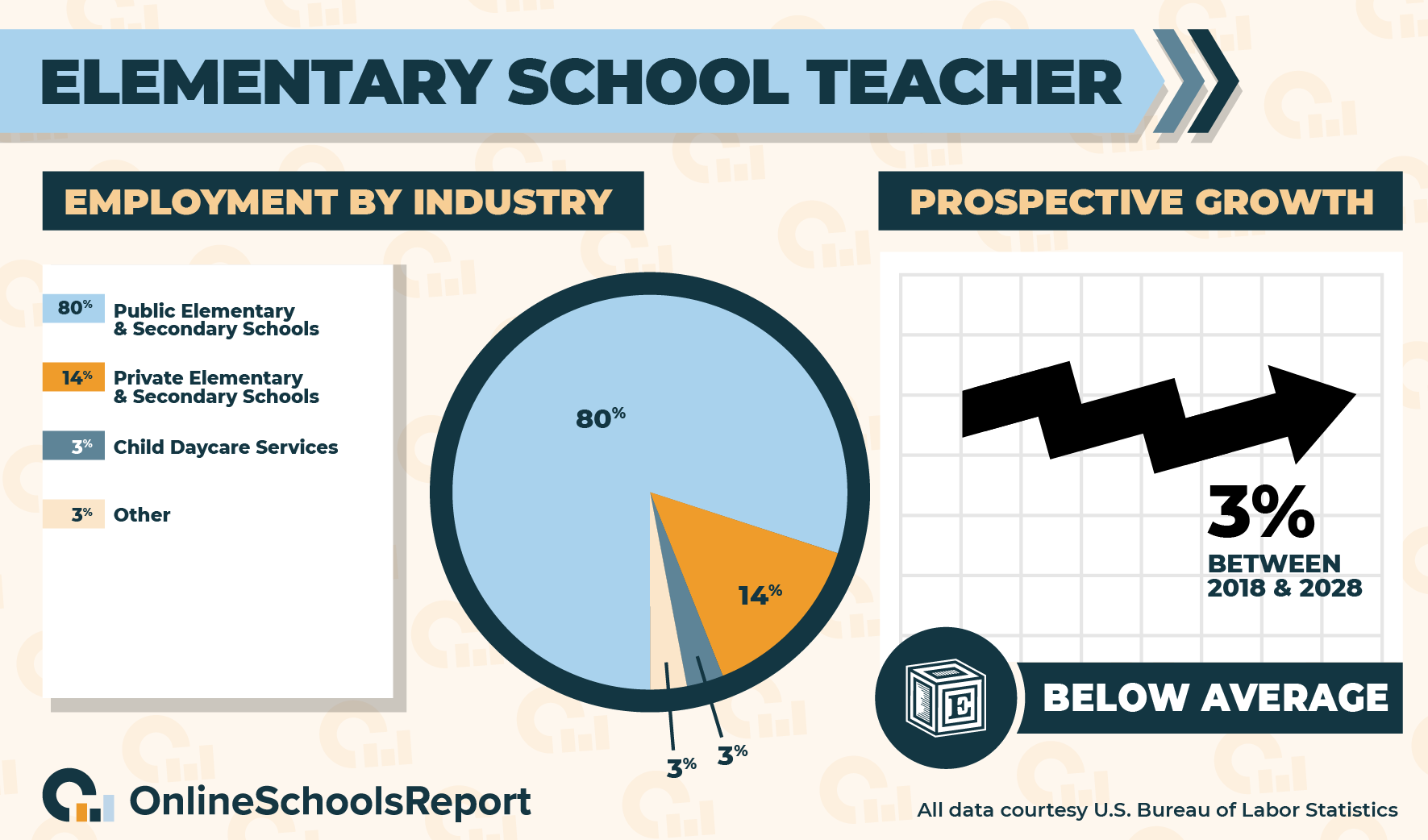
They also work to develop and enforce classroom rules and codes of conduct designed to teach children proper behavior. It’s common for elementary school teachers to teach several subjects throughout the day, including not only art and music, but also areas such as English as a second language (ESL), English for speakers of other languages (ESOL), or physical education.
Teachers also work to prepare students for state standardized testing, as well as supervising students beyond the classroom environment, including lunchtime and recess.
A bachelor’s degree as well as an additional teaching certification is required to work in this profession, though these requirements vary from state to state.
According to the Bureau of Labor Statistics, the average annual salary for an elementary school teacher is $59,420 as of 2019, with 1,569,000 jobs available across the U.S.
The states with the highest levels of employment in this profession, according to the Bureau of Labor Statistics, are California and Texas, while the highest concentrations of work in this field are in Vermont and Louisiana.
Childcare Center Director

A degree in early childhood education prepares graduates to work in more than just the public or private school systems.
Many directors of childcare centers begin their education in early childhood education, and after finishing their degree, choose to influence the lives of the younger generations in the context of a childcare center rather than a classroom. Many of which offer kindergarten and preschool services as well.
Primary tasks of directors at childcare centers can often include hiring, training, and supervising preschool teachers and childcare workers. Directors of childcare centers are also often charged with providing professional development opportunities for their staff, while also establishing and communicating the policies of the center to all interested parties.
Like teachers, directors of childcare centers develop educational programs and standards, while also maintaining high educational standards and high levels of educational excellence. Directors of childcare may also assist their staff in communication with children, as well as parents and guardians, frequently updating interested parties on a child’s progress and development.
They also prepare the budget and allocate funds, while maintaining high levels of cleanliness and maintenance in their facilities.
Some preschools and childcare centers are independently owned and operated, meaning directors must follow the instructions and guidelines of the owner. Other preschools and childcare centers belong to a nationwide chain or franchise, which means the director must work to ensure that their facility meets the standards and regulations laid down by the parent organization.
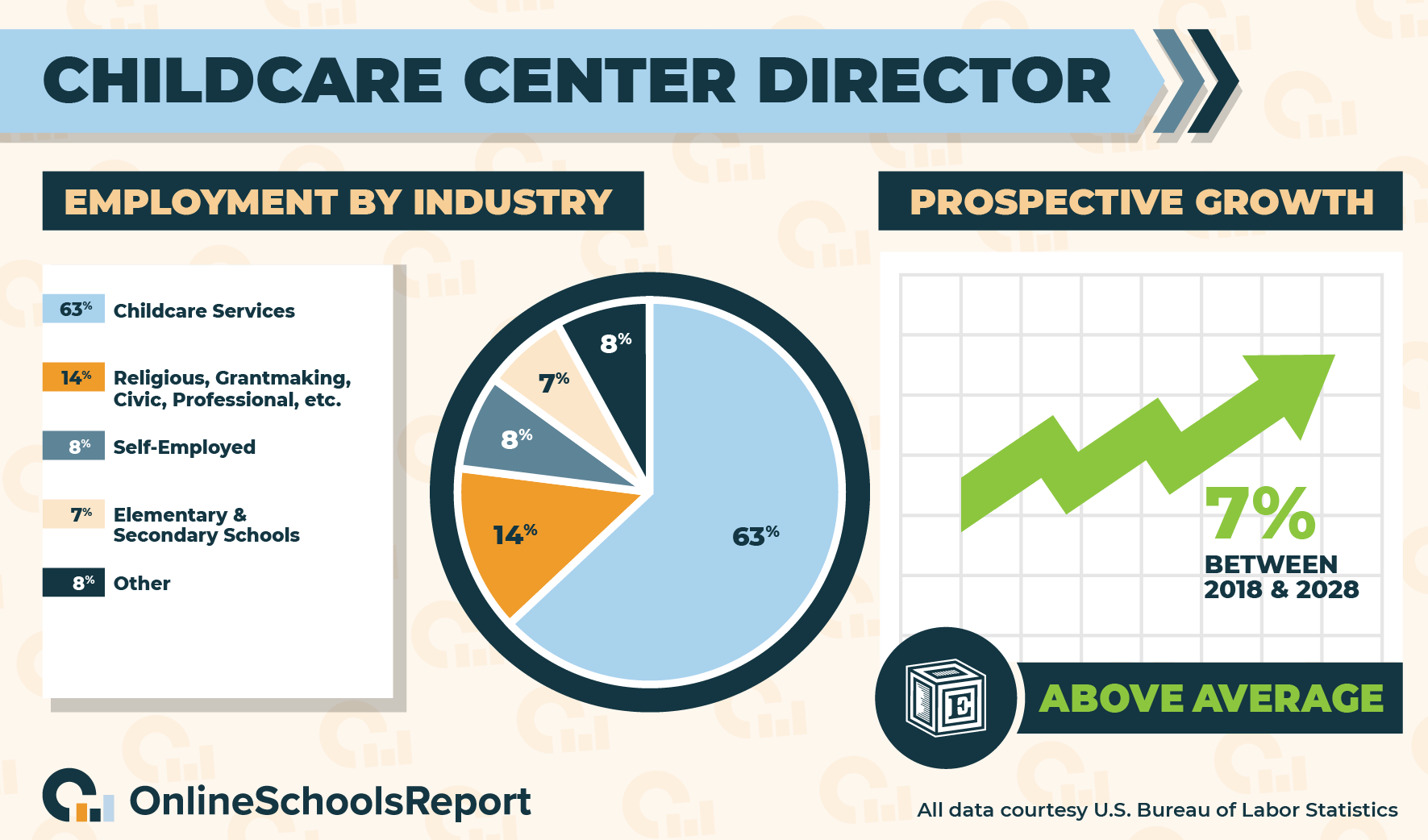
Additionally, some preschools and childcare centers receive state and federal funding, such as a Head Start program.
In this instance, directors must follow standards laid down by the Department of Health and Human Services, which concern programming, staffing, and the overall operation of the facilities.
According to the Bureau of Labor Statistics, as of 2019, $48,210 is the median pay for a director at a childcare center, with 7% job growth expected in the profession in the years ranging from 2018 to 2028, which is faster than the national average.
A bachelor’s degree is the minimum educational requirement to work as a director in most childcare centers, though advanced degrees help secure employment.
States with high levels of employment in this profession include California and Texas, while states with high concentrations of work in this profession include Vermont and New Hampshire, according to data from the Bureau of Labor Statistics.
Special Education Teacher

Another common career path for early childhood education majors is to become a special education teacher.
Special education teachers work specifically with children that have demonstrated, been diagnosed, or have been screened for significant learning, physical, emotional, or mental disabilities or developmental delays across all grade levels.
Special education teachers work to assess students’ skills, while also determining their educational needs. They then adapt general lesson plans to meet the needs of those students, which often takes the form of an IEP, or Individualized Education Program.
After implementing an IEP, special education teachers check milestones to assess a student’s progress.
Educators with this specialty also plan specific activities tailored to the abilities of a student with developmental delays or other forms of disability. They teach and mentor students in a classroom environment, in both small groups and one-on-one.
Other duties common among special education teachers include updating IEPs as goals shift and change as well as discussing this progress during frequent updates with parents, other teachers, counselors, and administrators.
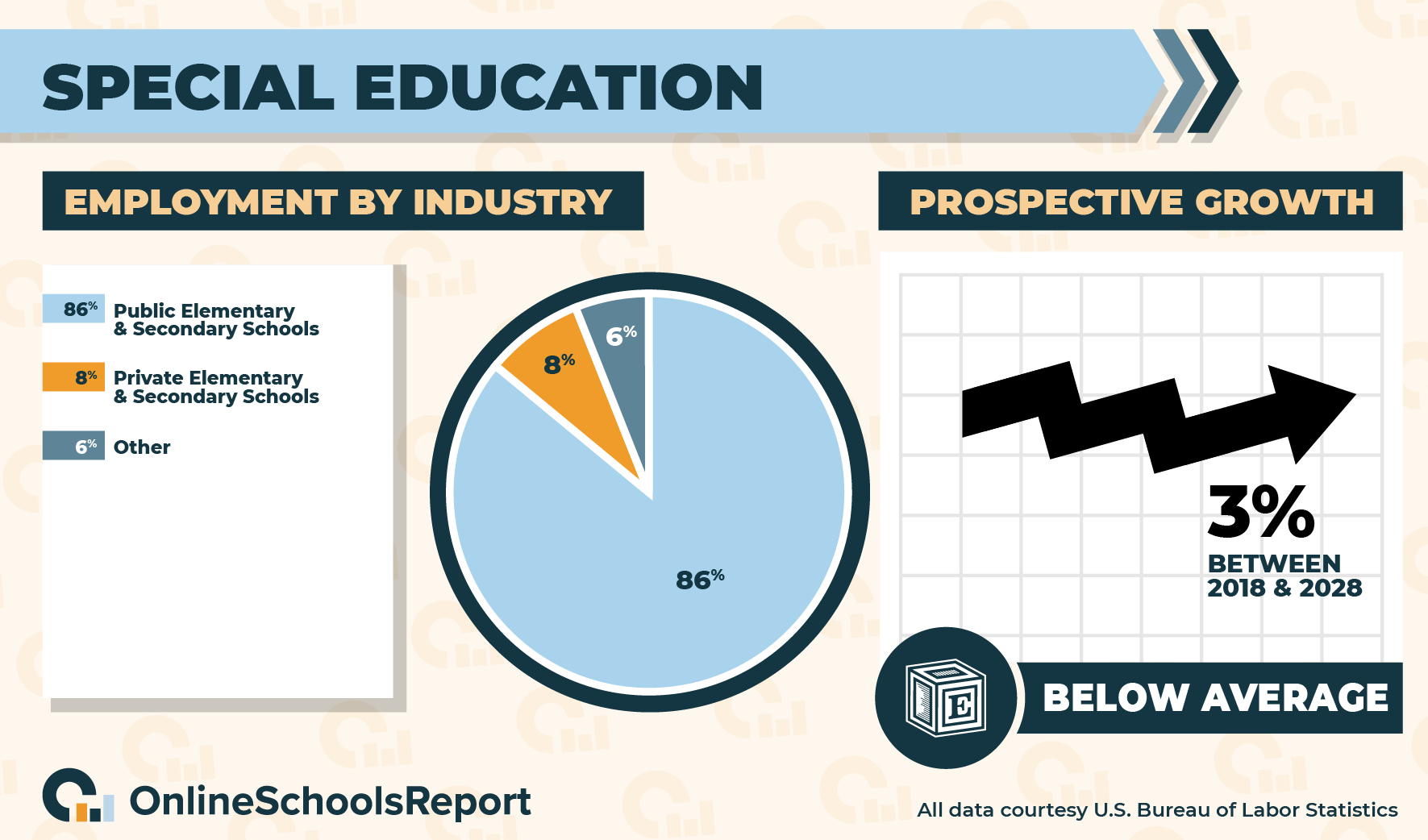
A bachelor’s degree is required to work as a special education teacher, with many institutions offering additional certification in special education. These certifications can help secure employment, though they aren’t always required.
The average salary in this field is $61,030, as of 2019, according to the Bureau of Labor Statistics, with 437,200 jobs in special education across the U.S. as of 2018. Job growth, though, is estimated to be only 3% in the years, which is below the national average.
States with high employment levels in special education at the elementary level include New York and Texas, and states with the highest concentrations of jobs include Delaware and New Jersey, according to data from the BLS.
Like any field or profession, networking is important, and there are several professional organizations to do so, including The National Association of Special Education Teachers, or NASET, as well as The Council for Exceptional Children.
Instructional Coordinator

Though it takes a master’s degree to work as an instructional coordinator, many of those who do find work in this field begin their career in early childhood education.
Instructional coordinators, also sometimes called curriculum specialists, develop and implement curriculums across all grade levels, including elementary. They are also commonly charged with training teachers to effectively implement the curriculum, as well as planning, organizing, and conducting conferences and workshops.
In addition, instructional coordinators analyze test data while assessing and discussing curriculum standards in collaboration with staff, which can include suggesting, approving, and reviewing textbooks and other possible course materials.
Instructional coordinators also evaluate the effectiveness of new techniques and curriculum against standards set by local school boards, as well as state and federal regulations.
Instructional coordinators also mentor and coach teachers to improve their skills, which can include observing teachers in the classroom. This may also include training related to educational technology.
While instructional coordinators work across all grade levels, many specialize in particular grades and subjects, particularly special education or English as a second language.
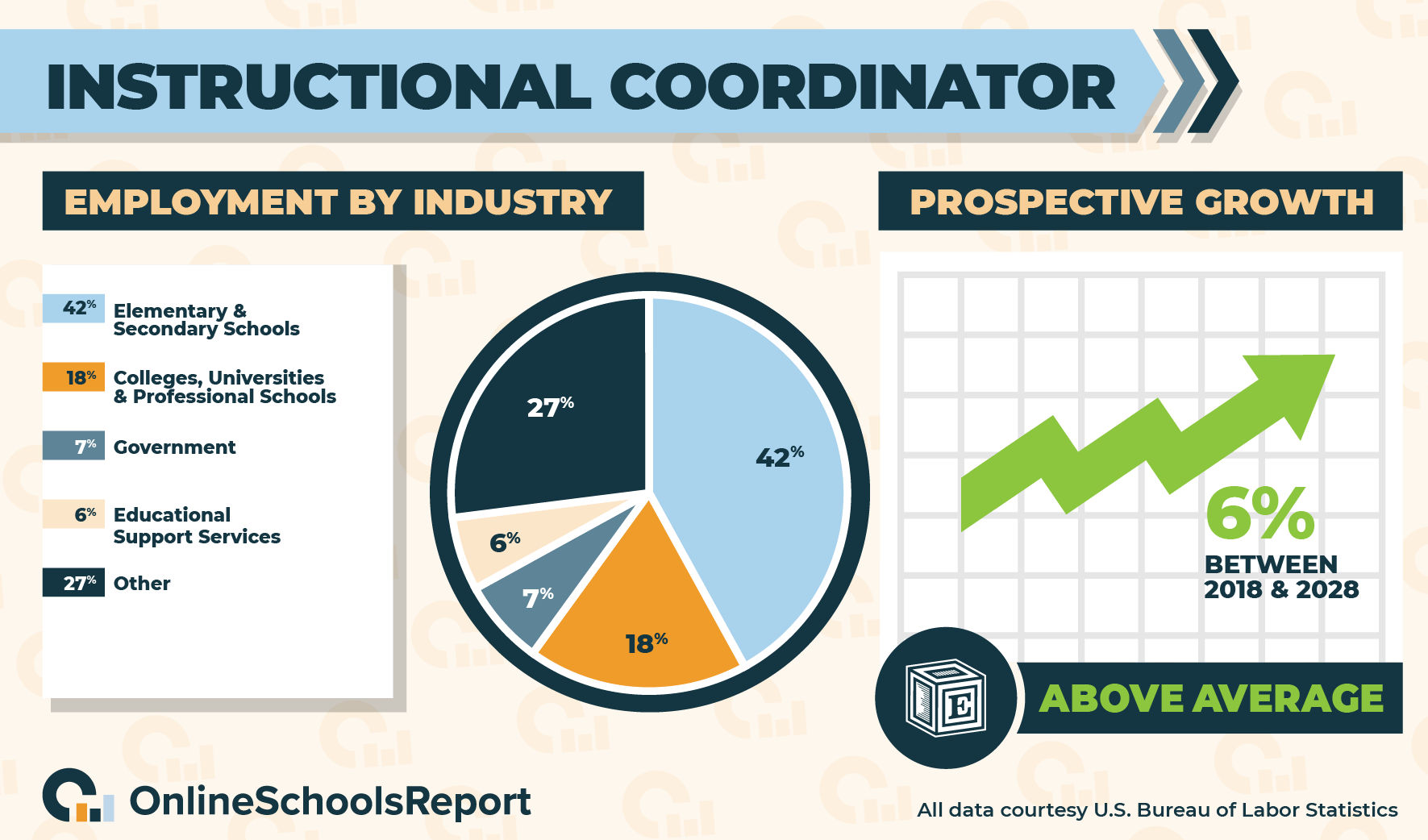
As of 2019, the average salary for an instructional coordinator or curriculum specialist is $66,290, according to the Bureau of Labor Statistics. A master’s degree in education or a related field is required to work in this field, as well as at least five years of on-the-job experience in education.
Also according to the BLS, 6% job growth is expected in this line of work in the timeframe spanning 2018 through 2028. States with high levels of concentration of employment in this occupation include California and Texas, with the highest concentration of jobs in this line of work in Georgia and Louisiana.
In most states, a curriculum specialist is required to hold state teaching or education administrator certification or licensure in the public school system.
Requirements may vary, however, especially in instructional coordinator positions outside the public school system. Once undergraduate work is completed in early childhood education, many go on to earn degrees in curriculum and instruction, such as a master’s degree in education (M.Ed. or EdM), an Educational Specialist (EdS) degree, a Doctor of Education (EdD), or a PhD in Education.
Early Childhood Education Degrees
Ready to get started? Here’s a quick overview of the degree opportunities available for those interested in early childhood education.
Associate Degree in Early Childhood Education

Earned at the community college or junior college level, or from an online institution, an associate degree in early childhood education can be the perfect jumping-off point for those eager to enter the workforce, or for those seeking to quickly and affordably earn transfer credits at a four-year college or university.
Like many other associate degree programs, an associate degree in early childhood education will focus on broad concepts related to the subject matter with an emphasis on the vocational, putting a premium on hands-on experience.
Concepts taught in early childhood education associate degree programs include theories ranging from techniques for effective learning and curriculum development to courses in student guidance, discipline, personal expression, and creativity. That’s in addition to general education requirements.
Those who wish to enter the workforce after completing their associate degree in early childhood education often become preschool teachers or teacher’s aides or assistants, though advancement opportunities and earning potential are somewhat limited.
It commonly takes 60 credit hours to complete an associate degree, or roughly two years of coursework, but this varies between programs.
A high school diploma or GED is required for admittance into an early childhood education program, with GPA requirements ranging from 2.0 to 2.5.
Credits earned in an associate degree program can also sometimes be applied to the formal education requirements of certifications, such as the Child Development Associate Credential, or CDA.
Bachelor’s Degree in Early Childhood Education

A four-year bachelor’s degree in early childhood education provides a comprehensive and in-depth education in the subject, moving from the vocational nature of an associate degree program to more theoretical concepts with practical applications.
A bachelor’s degree in early childhood education will focus on child development, different methods of teaching, and curriculum design. Students will also receive hands-on training in the classroom, preparing them to become the next generation of teachers and school administrators.
Additional topics covered in early childhood education programs can include child psychology, learning theory, and classroom leadership and management.
Some transfer to a four-year program in early childhood education after earning their associate degree, though many enter these programs with a high school diploma or GED, or even after some work experience in entry-level positions at preschools or childcare centers.
A bachelor’s degree in early childhood education also qualifies a graduate to work as a home-based service provider, family support specialist, researcher, or consultant.
Application requirements vary between programs, but many require at least a 2.0 GPA. Letters of recommendation and statements of personal intent may also be required. Most bachelor’s degree programs involve 120 credits of coursework, and many complete these programs in roughly four years, though, again, this varies.
Many cut down the cost of a bachelor’s degree by completing some coursework at a community or junior college, or save money with more affordable online options.
To become certified to teach at the elementary level, a bachelor’s degree is required in most states. This four-year degree also qualifies graduates to move to graduate-level programs, further advancing employment opportunities and earning potential.
Master’s Degree in Early Childhood Education

Master’s degrees in early childhood education are often sought by those who have completed their bachelor’s, and perhaps even after earning their teaching certificate.
Although you don’t need a master’s degree to teach, this degree can significantly increase both earning potential and opportunities for employment in school administration and the private sector. Additionally, a master’s degree in early childhood education will simply help make you a better educator.
Master’s degree programs can be completed in about a year or two for those who already hold their teaching certificate. Coursework won’t take much longer than that for those who don’t already have their certification. Many master’s degree programs offer a fast track to becoming a certified teacher.
Coursework in graduate-level programs in early childhood education focuses on child psychology and development, as well as learning theory and curriculum design. You will also become an expert in the following: research techniques, diversity sensitivity, and classroom management. And through practicum/student teaching, these concepts are immediately able to be put into practice.
A terminal thesis will also be required.
An undergraduate degree is required for admittance into a master’s degree program in early childhood education, with most requiring a GPA between 2.0 and 2.5.
Submitting GRE or GMAT scores may also be required, as well as letters of recommendation and a statement of intent. A terminal thesis is most often required to graduate.
Most often, 36–54 semester credits, or from between 60–90 quarter credits, are required to complete a master’s degree. That’s about 12 to 18 college courses, or about two years of study.
As previously stated, those holding their teaching certificate can get through many early childhood education master’s degree programs more quickly than that, with most designed to work around the schedule of a working professional.
Doctoral Degrees in Early Childhood Education

Moving further into the theoretical side of education, doctoral degree programs prepare those who hold their master’s degree in early childhood education for work in school administration, teacher preparation, and educational research, as well as setting educational policy at the government level.
Doctoral degree programs provide an even deeper, more thorough, and comprehensive education in child development, psychology, and learning. Graduates will also display expert-level competency in learning theories, research, leadership, and educational methodologies.
Those who enroll in a doctoral degree program in early childhood education can earn a Ph.D., or an EdD, which is a doctorate in education.
Almost all programs are designed to be scheduled around the working life of a teacher or education professional, with many programs available entirely online or with some portion of the program able to be completed virtually.
Nevertheless, the average Ph.D. program can take a long time to complete — up to 8 years — though typical coursework which can consist of seminars, weekend conferences, and luncheons. This is in addition to the traditional classroom environment, which is often completed in the first two years.
The remaining time in the program will be spent developing and completing a doctoral thesis, bringing new insight and deep thought to the field of early childhood education.
Master’s degrees are often required to be admitted into a Ph.D. program, though some bachelor’s degree programs offer a fast-track option to Ph.D.
Other related degrees can sometimes be accepted, as long as certain prerequisites have been completed.





